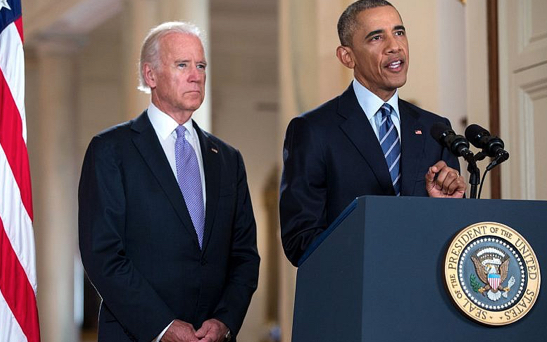March 10, 2021 by JNS
Read on for article
A new report by the Jewish Institute for National Security of America (JINSA) details how it would nearly impossible both politically and technically for the Biden administration to return to the 2015 Iran nuclear deal, the Joint Comprehensive Plan of Action, or JCPOA.

Former U.S. President Barack Obama, flanked by Vice President Joe Biden, delivers a statement on the Iran nuclear agreement in the East Room of the White House on July 14, 2015. Credit: Official White House Photo by Pete Souza.
According to “No going back now: The case against returning to the JCPOA,” Iran has violated the original agreement to such an extent that “simply abiding by the letter of the JCPOA would leave Iran with too advanced a nuclear program for the United States to accept, and too many economic constraints for Tehran to abide.”
“This creates the possibility of an untenable ‘more for less’ interim outcome in which the United States tries to get back to the original nuclear agreement by giving up too many sanctions in exchange for too few nuclear concessions from Tehran,” it said.
The report listed several technical, political and strategic hurdles that would likely make it impossible to return to the deal. Among them is the fact that it would take Iran several months to reverse its violations of the JCPOA, including uninstalling centrifuges, and diluting and cutting its enriched uranium stockpile. Iran has also taken several actions to expand its nuclear infrastructure beyond what was considered in the agreement, such as experimenting with advanced centrifuges and building new underground facilities.
“Since the JCPOA’s implementation in 2015, the world has learned more about the existence and scope of Iran’s nuclear-weapons program, primarily due to Israel’s covert seizure of secret Iranian nuclear archives in 2018. Returning to the JCPOA would do nothing to resolve the growing list of inspectors’ concerns about the full extent of Iran’s weaponization work, nor the fact that Iran has been acting in bad faith since 2015 toward the other JCPOA participants,” said the report.
Politically, the Biden administration would also face an uphill battle with Congress, which would have to remove or waive certain sanctions. The Biden administration will also have to weigh contending viewpoints that are highly sceptical of any return to the deal.
Meanwhile, in Iran, hardliners within the regime are also highly wary of the JCPOA and engagement with the United States, according to the report, leaving little flexibility for ostensibly more “moderate” leaders like President Hassan Rouhani to ensure Iran’s return to compliance.
The Biden administration has urged Iran to go back to the parameters of the original deal in order to restart negotiations and lift heavy sanctions imposed under the Trump administration. So far, the Islamic regime has rejected any return to strict compliance with the original deal.
Michael Makovsky, president and CEO of JINSA, said “the Biden administration has demanded that Tehran come back into strict compliance with the JCPOA before the U.S. re-enters the agreement, but it should recognize that it is impossible to go back to the original deal and dangerous to try. Iran’s nuclear program is far more advanced than in 2015, while U.S. sanctions are far more extensive.
“Attempting to abide by the JCPOA would result in more for less: Iran more capable and the U.S. with less leverage,” he continued. “The Biden administration must hold strong to the position that a bad deal is worse than no deal.”
JNS
 RSS Feed
RSS Feed















 March 10th, 2021
March 10th, 2021  Awake Goy
Awake Goy  Posted in
Posted in  Tags:
Tags: 













